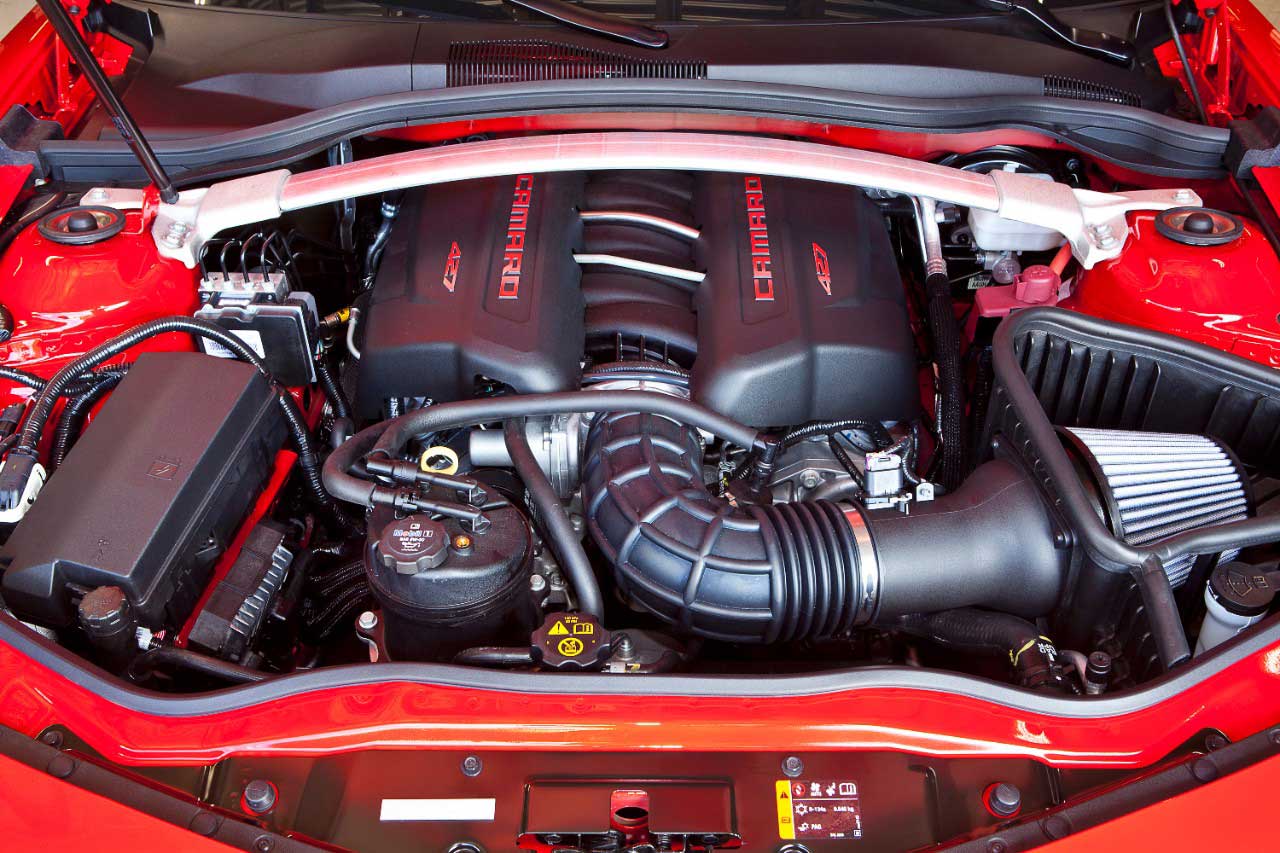LS7 Engine Specs: Performance, Bore & Stroke, Cylinder Heads, Cam Specs & More

The LS7 was found in the 2006-13 Corvette Z06 and 2013 Corvette 427, plus the 2014-15 Camaro Z/28. (Image/GM Corporate Newsroom)
Mechanically similar, General Motors’ LS and LS-based Vortec engines wound up on almost every branch of the GM family tree: Chevy, Pontiac, GMC, Cadillac, Buick—heck, even Saab, Hummer, and Isuzu got some LS love.
Since LS and Vortec engines are so common, they’ve become the go-to performance and swap engines of the modern era.
These motors are capable of making a lot of horsepower, and respond well to upgrades like turbos, superchargers, high-flow cylinder heads, intake systems, cams, and nitrous oxide.
The aftermarket is strong, crate engines are available, and used motors are often cheaply sourced through junkyards.
Summit Racing has created a series of comprehensive guides for each engine in the LS family, so engine builders and tuners can have a handy reference for their projects.
This specific guide is for the GM LS7 engine.
[Do you have an LS7 engine you want to upgrade? Read: LS7 Engine Upgrade Guide: Expert Advice for LS7 Engine Mods to Maximize Performance.]
You can explore all of our LS engine spec guides and LS tech resources here.
(Summit Racing’s Brian Nutter and Paul Spurlock contributed to this article.)
Chevy LS7 Engine Specs
The LS7 is a Gen. 4, 7.0L, aluminum small block engine. It was available in GM’s high performance cars between 2006 and 2015.
The LS7 is the largest displacement engine in the LS family. It is unique because it was based on the C5-R Le Mans Corvette racing engine. It was purpose-built for high performance.
Top-End Features
- Unique high-flow, CNC-ported, square port, cylinder heads and intake manifold
- Titanium intake valves
- 1.8 ratio rockers
- A high lift, long duration camshaft
Bottom-End Features
- Doweled, billet steel main caps
- Forged steel crankshaft
- Titanium connecting rods
Other Performance Features
- Block machining performed using deck plates to increase accuracy
- Piston oil-squrters
- A high-capacity, dry sump oiling system
With these modifications, the LS7 can easily rev to 7,100 rpm. The information listed here is for a stock engine.
[table “123” not found /][table “124” not found /]
[table “125” not found /]
[table “126” not found /]
[table “127” not found /]
[table “128” not found /]
[table “129” not found /]
[table “130” not found /]





This engine was also fitted to the limited edition HSV W427. A beast of a car!
I’ve got a ’09 Z06 that for some reason just started missing…sitting in the driveway mind you! A noticeable tapping that was the initial indicator that something was wrong. When I revved the engine just a bit, I noticed the miss. This has never been an issue; the car has about 17K miles on it; I’m the original owner and I’ve never driven the car hard. I immediately shut the engine off and pushed it back in the garage. I’ve been reading/researching about the “valve drop” problem with the Z06’s. Been looking at options to address the valve drop problem….but torn between rebuilding the existing heads, or replacing with after market heads, which your article indicates is likely a better option. Dealership won’t touch pulling existing heads and installing after market heads. Senior Vette mechanic at dealership recommends rebuilding. I’m no expert, but know I’ve got to do something. Would really love to hear from experts who know the LS7 better than I do. Thoughts?
John, sorry to hear about the issue with your Z. If a new set of TFS 260’s with their revised geometry isn’t a possibility, the next be option is to rebuild your present heads.
There are specialists who know exactly what needs to be done. Call Total Engine Airflow at 330-634-2155.
They have a rebuild program where they replace the guides, exhaust valves, remanufacturer the Titanium intake valves, replace seats if necessary, and do a competition valve job. The price is reasonable and you will be good to go.
Hi John,
Prior to taking your cylinder heads off for a rebuild, I would get a mechanics stethoscope and pinpoint the noise location. Once located, pull that valve cover and inspect the rocker arms, see if a rocker may have unusual lash or no preload. Bring each rocker to the valve closed position to check, and try to push the rocker to force the lifter plungers to collapse. If something is unusual, investigate further… check that the rocker bolt is torqued. Check the valve spring ( they do break occasionally). Check pushrod tips and rocker cups… they can take it hard sometimes.
Yes the LS7’s have exhaust valve issues, they can drop, and I’ve fixed a ton of them. Usually the drop happens at high rpm. Since you don’t abuse the engine, I suggest looking other places. When these heads are off, I Normally replace exhausts with a Manley or Ferrea valve.
Ticking can be many things…. from a lifter plunger issue to an exhaust flange gasket leak. Since you have a distinct “miss”….check the exhaust header tubes with a heat gun (or touch with a saliva coated finger ;)…) when running. Isolate any dead cylinder(s). I can keep writing, however feel free to call. Ted at CNC Racing Heads. 630-917-2840
Hi John,
My 2012 ran like crap out of nowhere, and it was all due to a spark plug wire that had worked itself loose. Check the cheap stuff before you go into the esoteric possibilities.
Peace.
Nathan